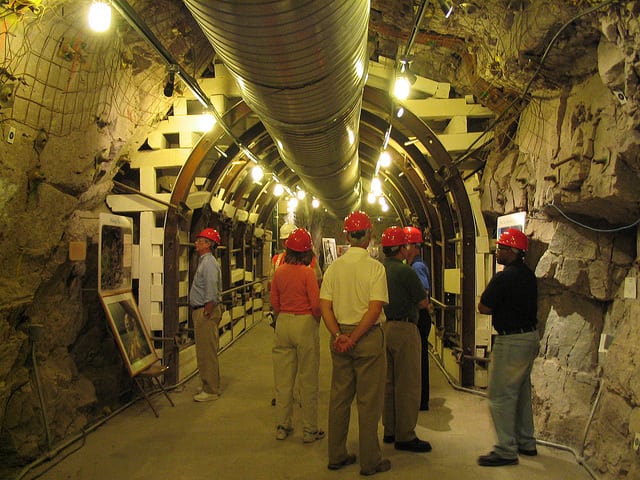
The House Appropriations Committee again teed up an inter-chamber debate about the future of U.S. nuclear waste disposal this week when it voted along party lines to give the White House $100 million more than it sought in fiscal year 2019 for Yucca Mountain.
In a Wednesday markup, the committee also shot down an amendment, again along party lines, that would have removed the bonus funding for Yucca and steered it toward other DOE programs.
The committee voted 29-20 to send the bill to the House floor. It would provide DOE and the Nuclear Regulatory Commission (NRC) with a combined $267 million in 2019 to restart the agency’s application to license Yucca as a permanent repository for spent nuclear fuel and high-level radioactive waste, as Congress ordered more than 30 years ago.
The House committee’s bill was not scheduled for a floor vote at deadline Friday for RadWaste Monitor. The Senate Appropriations energy and water development subcommittee was set to unveil its version of the DOE and NRC 2019 budget next week, with the panel’s markup scheduled for Tuesday and full committee action on Thursday.
The Obama administration stopped the Yucca Mountain licensing proceeding nearly a decade ago. The Trump administration has sought to revive the project, but with little progress to date. Yucca was a nonstarter in the Senate last year, and the fiscal 2018 omnibus budget signed into law in March zeroed out money for the project.
House appropriators provided $100 million more than the White House sought for Yucca in fiscal 2019, which begins on Oct. 1. The proposed increase for the repository is all on the DOE side, and all within the agency’s Nuclear Waste Disposal account. The administration sought $90 million and would receive $190 million for this account, which handles matters related to civilian nuclear waste.
With that funding, DOE should “reestablish its capability to respond to the Nuclear Regulatory Commission during the adjudicatory process and to otherwise fully support the Yucca Mountain licensing process,” according to a detailed report appended to the bill.
Meanwhile, DOE’s Defense Nuclear Waste Disposal account, which handles government-generated waste, would receive $30 million for Yucca operations, while NRC would get $47.7 million to adjudicate the DOE application: exactly what the White House requested for both accounts.
During the committee markup, Rep. Matt Cartwright (D-Pa.) proposed the amendment to restore $271 million lost between the current enacted budget and the bill’s fiscal 2019 proposal for DOE’s Office of Energy Efficiency and Renewable Energy and its Advanced Research Projects Agency-Energy (ARPA-E). As part of that, his amendment would have eliminated the $100 million increase in DOE funding for Yucca.
The committee voted 28-21 against the amendment.
“This bill is not about parity and fairness,” Rep. Mike Simpson (R-Idaho), chairman of the House Appropriations energy and water subcommittee, said during the markup. “It’s about priorities.”
“Meeting the nation’s obligations to store spend fuel is one of the highest priorities of this bill,” Simpson said. “Funds above the request [for Yucca] are necessary to advance the Department of Energy’s ability to fully participate in the licensing process and reestablish its previous capabilities to support Yucca Mountain.”
Nevada’s entire congressional delegation, and Sen. Dean Heller (R-Nev.) especially, oppose the project.
Heller, who is running for re-election to a Senate with a 51-49 GOP margin, has threatened to stonewall any bill that provides funding for the repository.
In a letter Thursday to the leaders of the Senate Appropriations energy and water committee, Heller and fellow Nevada Sen. Catherine Cortez Masto (D) urged support for a consent-based approach to nuclear waste siting rather than Yucca Mountain. In such an approach, local and state governments, among other stakeholders, would have to assent to disposal of radioactive waste in their area.
As the subcommittee “continues its work on the FY 2019 Energy and Water Appropriations bill, we respectfully request that you include report language indicating support for a consent-based storage solution,” the Nevada lawmakers wrote. “Consistent with our approach in S.95, the Nuclear Waste Informed Consent Act, we believe that to be viable, any storage solution, whether interim or long term, must be rooted in consent.”